Unit1 How do you study for a test? Section B
文档属性
| 名称 | Unit1 How do you study for a test? Section B |
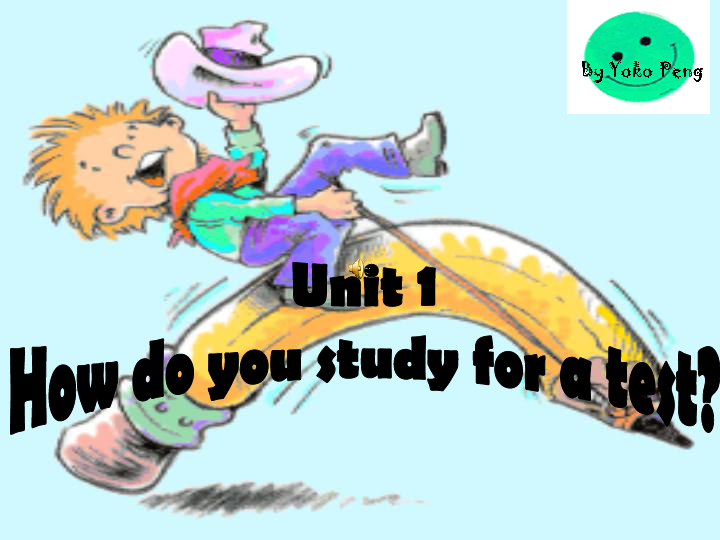
|
|
| 格式 | rar | ||
| 文件大小 | 3.3MB | ||
| 资源类型 | 教案 | ||
| 版本资源 | 人教新目标(Go for it)版 | ||
| 科目 | 英语 | ||
| 更新时间 | 2008-02-23 00:00:00 | ||
图片预览

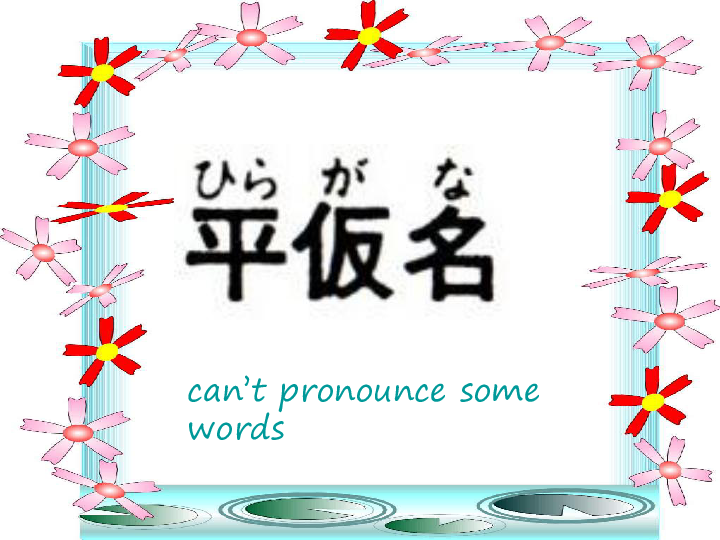
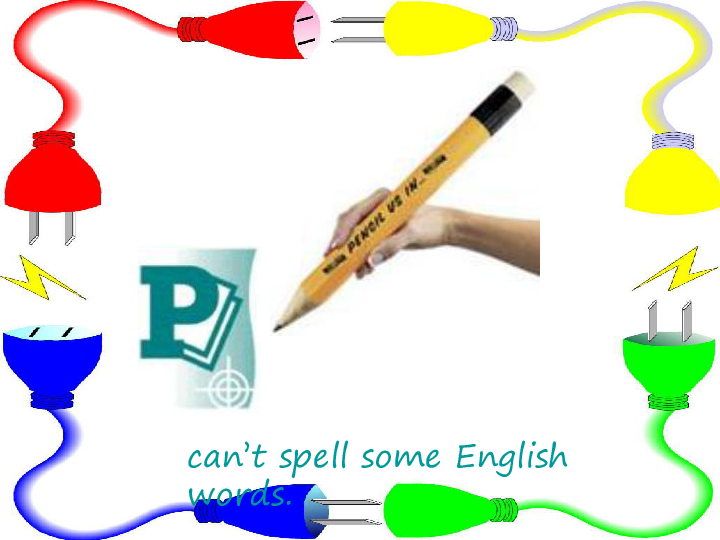
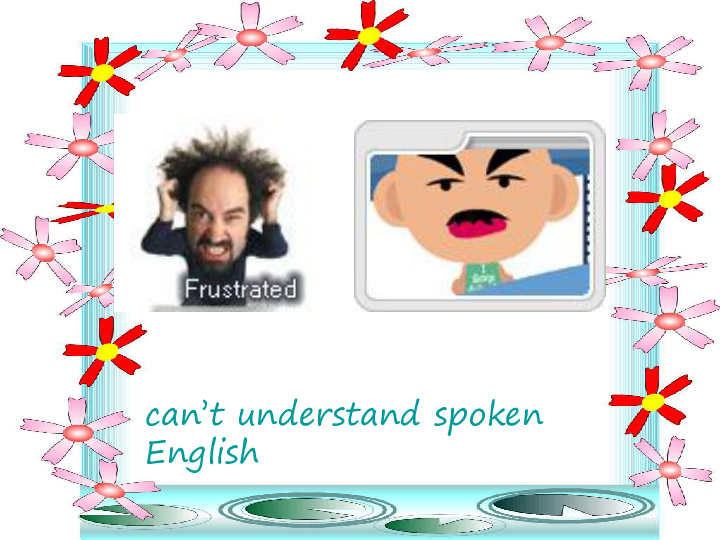
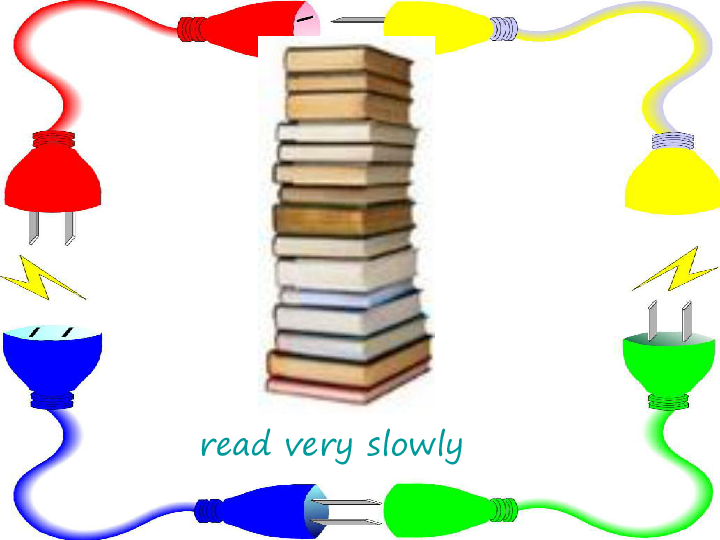
文档简介
课件23张PPT。Unit 1
How do you study for a test?can’t pronounce some wordscan’t spell some English words.can’t understand spoken Englishread very slowlycan’t spell some English wordsmake mistake in grammarLearning English can be difficult. I can’t pronounce some of the words.I can’t understand spoken English.I read very slowly.I can’t spell some English words. I make mistakes in Grammar.Section B1a Learning English can be difficult. What things are difficult for you? Read the list. Check (?) the statements that are true for you. I can’t pronounce some of the words.
I can’t understand spoken English.
I read very slowly.
I can’t spell some English words.
I make mistakes in grammar.v.发…音;正确(或清晰地)吐(字、音等)adj.口语的;口说的;口头的v.慢地;缓慢地犯错;出错1b What other things are difficult for you? Make a list.1. I don’t know how to use commas.
2. .
3. .n.逗号2a Paul is learning English. Listen and check (?)the learning challenges he talks about. Challenges
1. can’t get the pronunciation right
2. forget a lot of new words
3. can’t always understand when people talk to me
4. can’t understand the words in magazines
5. don’t get much writing practice????n.挑战2b Listen again. Match the challenges in 2a with the solutions. Solutions
a. You can always write the new words in your notebook and study them at home.
b. You should find a pen pal.
c. Listening can help.
d. Why don’t you join an English language club to practice speaking English?2513n.(问题;疑难等的)解决;解答T: You looked worried, Paul.
B: I am, Ms Mitchell. I’m having trouble learning English.
T: You said you liked English. What’s the problem?
B: I can’t get the pronunciation right.
T: Well, listening can help. Why don’t you borrow the teacher’s tapes. You can listen to them at home and repeat the sentences that are difficult for you.
B: That’s a good idea. But what about all the new words? I forget a lot of new words.
T: You can always write the new words in your notebook and study them at home. You can even study in the train on the way to school.
B: That might really help! Thanks!
T: Can you understand when people talk to you?
B: Well, no. Not always. Sometimes I just don’t understand what people are saying.
T: Why don’t join an English language club to practice speaking English? The English club meets after school on Tuesdays and Thursdays.
B: Maybe I’ll go. The only other problem I have is that I don’t get much writing practice.
T: Maybe you should find a pen pal.
B: That sounds like a fun way to practice writing. Thanks, Ms Mitchell.2c PAIRWORK Role play conversations using the information from activities 2a and 2b.A: I don’t have a partner to practice English with.
B: Maybe you should join an English language club.3a Read the article. Then read the statements about the article. Write “T”(for true) or “F”(for false). How I learned to learn English Last year my English class was difficult for me. First of all, it wasn’t easy for me to understand the teacher when she talked to the class. To begin with, she spoke too quickly, and I couldn’t understand every word. Later on, I realized that it doesn’t matter if you don’t understand every word. Also I was afraid to speak in class, because I thought my classmate might laugh at me.I couldn’t always make complete sentences, either.later on 以后;随后be afraid to do sth害怕去做… be afraid of sth/doing sth be afraid+that引导的从句laugh at sb笑话;取笑(某人)complete adj. 完整的;完全的sentence n. 句子 make a sentence 造句first of all 首先;第一Then I started to watch English language TV. It helped a lot. I think that doing lots of listening practice is one of the secrets of becoming a good language learner. Another thing that I found very difficult was English Grammar. So I decided to take lots of grammar notes in every class. Then I started to write my own original sentences using the grammar I was learning. It’s amazing how much this helped. Now I am enjoying learning English and I got an A this term. My teacher is very impressed.secret n.秘密;机密learner n.学习者take notes 做笔记;做记录enjoy doing 喜欢做…乐于做…term n.学期impress v. 使感动…;给…深刻印象impress sth on sb /impress sb with sth 使某人铭记某事Write “T”(for true) or “F”(for false)The writer found learning English difficult because…
1. the teacher’s pronunciation was poor.
2. people always laughed at her when she spoke.
3. she had trouble making complete sentences.
4. English grammar was difficult.
Her English improved when she started..
5. going out with English-speaking friends.
6. lots of speaking practice.
7. using grammar in original sentences.FFFFTTT3b Write a letter telling a friend how to become a better language learner.Dear ,
I know it isn’t easy to learn , but I have some ideas that may help. You said you couldn’t understand people who talked fast. Well, you can try to listen for the most important words, not every word.
Yours,fast adv.快地;迅速地4 INTERVIEW Ask three classmates about learning English. Take notes. Then tell the class about their answers.1. What isn’t easy about learning English?
2. What do you do about this?
3. What is your favorite way to learn more English?Han Wen says that listening is sometimes difficult if people speak too fast.SELF CHECK1 Fill in each blank with the correct word given.Change the form of the word if necessary.feel spell write down join find1. You should new English words in a vocabulary list.
2. If you son’t know how to new words, look them up in a dictionary.
3. The best way to improve your English is to an English club.
4. Another thing that he very difficult was English grammar.
5. This kind of paper very soft.write downspelljoinfindsfeels2 Xu Zheng won the English prize at his school. Later, a reporter of the school magazine interviewed him. Here are the reporter’s notes on Xu Zheng and his essay on why English is important. Use them to write an article about Xu Zheng. Note on Xu Zheng Likes: writing notes/watching movies/listening to pop songs Finds difficult: pronunciation/native speakers talking too fast Learns by: making up conversations/speaking to friends in English Notes on Xu Zheng’s essay 1. Most people speak English as a secong language. 2. English is popular around the world for computers. 3. English is popular in science. 4. English can help us understand many new books and movies.adj. 本土的;本族的n. 讲话者;说话者组成;构成
How do you study for a test?can’t pronounce some wordscan’t spell some English words.can’t understand spoken Englishread very slowlycan’t spell some English wordsmake mistake in grammarLearning English can be difficult. I can’t pronounce some of the words.I can’t understand spoken English.I read very slowly.I can’t spell some English words. I make mistakes in Grammar.Section B1a Learning English can be difficult. What things are difficult for you? Read the list. Check (?) the statements that are true for you. I can’t pronounce some of the words.
I can’t understand spoken English.
I read very slowly.
I can’t spell some English words.
I make mistakes in grammar.v.发…音;正确(或清晰地)吐(字、音等)adj.口语的;口说的;口头的v.慢地;缓慢地犯错;出错1b What other things are difficult for you? Make a list.1. I don’t know how to use commas.
2. .
3. .n.逗号2a Paul is learning English. Listen and check (?)the learning challenges he talks about. Challenges
1. can’t get the pronunciation right
2. forget a lot of new words
3. can’t always understand when people talk to me
4. can’t understand the words in magazines
5. don’t get much writing practice????n.挑战2b Listen again. Match the challenges in 2a with the solutions. Solutions
a. You can always write the new words in your notebook and study them at home.
b. You should find a pen pal.
c. Listening can help.
d. Why don’t you join an English language club to practice speaking English?2513n.(问题;疑难等的)解决;解答T: You looked worried, Paul.
B: I am, Ms Mitchell. I’m having trouble learning English.
T: You said you liked English. What’s the problem?
B: I can’t get the pronunciation right.
T: Well, listening can help. Why don’t you borrow the teacher’s tapes. You can listen to them at home and repeat the sentences that are difficult for you.
B: That’s a good idea. But what about all the new words? I forget a lot of new words.
T: You can always write the new words in your notebook and study them at home. You can even study in the train on the way to school.
B: That might really help! Thanks!
T: Can you understand when people talk to you?
B: Well, no. Not always. Sometimes I just don’t understand what people are saying.
T: Why don’t join an English language club to practice speaking English? The English club meets after school on Tuesdays and Thursdays.
B: Maybe I’ll go. The only other problem I have is that I don’t get much writing practice.
T: Maybe you should find a pen pal.
B: That sounds like a fun way to practice writing. Thanks, Ms Mitchell.2c PAIRWORK Role play conversations using the information from activities 2a and 2b.A: I don’t have a partner to practice English with.
B: Maybe you should join an English language club.3a Read the article. Then read the statements about the article. Write “T”(for true) or “F”(for false). How I learned to learn English Last year my English class was difficult for me. First of all, it wasn’t easy for me to understand the teacher when she talked to the class. To begin with, she spoke too quickly, and I couldn’t understand every word. Later on, I realized that it doesn’t matter if you don’t understand every word. Also I was afraid to speak in class, because I thought my classmate might laugh at me.I couldn’t always make complete sentences, either.later on 以后;随后be afraid to do sth害怕去做… be afraid of sth/doing sth be afraid+that引导的从句laugh at sb笑话;取笑(某人)complete adj. 完整的;完全的sentence n. 句子 make a sentence 造句first of all 首先;第一Then I started to watch English language TV. It helped a lot. I think that doing lots of listening practice is one of the secrets of becoming a good language learner. Another thing that I found very difficult was English Grammar. So I decided to take lots of grammar notes in every class. Then I started to write my own original sentences using the grammar I was learning. It’s amazing how much this helped. Now I am enjoying learning English and I got an A this term. My teacher is very impressed.secret n.秘密;机密learner n.学习者take notes 做笔记;做记录enjoy doing 喜欢做…乐于做…term n.学期impress v. 使感动…;给…深刻印象impress sth on sb /impress sb with sth 使某人铭记某事Write “T”(for true) or “F”(for false)The writer found learning English difficult because…
1. the teacher’s pronunciation was poor.
2. people always laughed at her when she spoke.
3. she had trouble making complete sentences.
4. English grammar was difficult.
Her English improved when she started..
5. going out with English-speaking friends.
6. lots of speaking practice.
7. using grammar in original sentences.FFFFTTT3b Write a letter telling a friend how to become a better language learner.Dear ,
I know it isn’t easy to learn , but I have some ideas that may help. You said you couldn’t understand people who talked fast. Well, you can try to listen for the most important words, not every word.
Yours,fast adv.快地;迅速地4 INTERVIEW Ask three classmates about learning English. Take notes. Then tell the class about their answers.1. What isn’t easy about learning English?
2. What do you do about this?
3. What is your favorite way to learn more English?Han Wen says that listening is sometimes difficult if people speak too fast.SELF CHECK1 Fill in each blank with the correct word given.Change the form of the word if necessary.feel spell write down join find1. You should new English words in a vocabulary list.
2. If you son’t know how to new words, look them up in a dictionary.
3. The best way to improve your English is to an English club.
4. Another thing that he very difficult was English grammar.
5. This kind of paper very soft.write downspelljoinfindsfeels2 Xu Zheng won the English prize at his school. Later, a reporter of the school magazine interviewed him. Here are the reporter’s notes on Xu Zheng and his essay on why English is important. Use them to write an article about Xu Zheng. Note on Xu Zheng Likes: writing notes/watching movies/listening to pop songs Finds difficult: pronunciation/native speakers talking too fast Learns by: making up conversations/speaking to friends in English Notes on Xu Zheng’s essay 1. Most people speak English as a secong language. 2. English is popular around the world for computers. 3. English is popular in science. 4. English can help us understand many new books and movies.adj. 本土的;本族的n. 讲话者;说话者组成;构成
同课章节目录
- Unit 1 How can we become good learners.
- Section A
- Section B
- Unit 2 I think that mooncakes are delicious!
- Section A
- Section B
- Unit 3 Could you please tell me where the restroom
- Section A
- Section B
- Unit 4 I used to be afraid of the dark.
- Section A
- Section B
- Unit 5 What are the shirts made of?
- Section A
- Section B
- Review of Units 1-5
- Unit 6 When was it invented?
- Section A
- Section B
- Unit 7 Teenagers should be allowed to choose their
- Section A
- Section B
- Unit 8 It must belong to Carla.
- Section A
- Section B
- Unit 9 I like music that I can dance to.
- Section A
- Section B
- Unit 10 You're supposed to shake hands.
- Section A
- Section B
- Review of Units 6-10
- Unit 11 Sad movies make me cry.
- Section A
- Section B
- Unit 12 Life is full of the unexpected
- Section A
- Section B
- Unit 13 We're trying to save the earth!
- Section A
- Section B
- Unit 14 I remember meeting all of you in Grade 7.
- Section A
- Section B
- Review of Units 11-14
